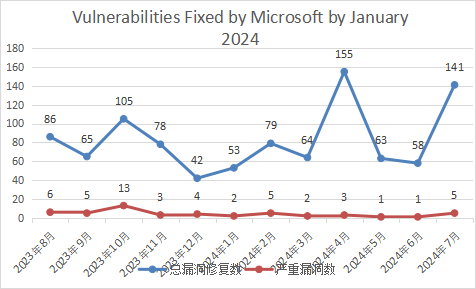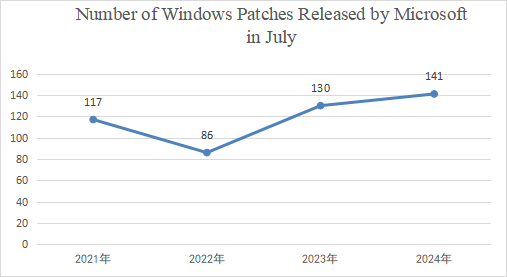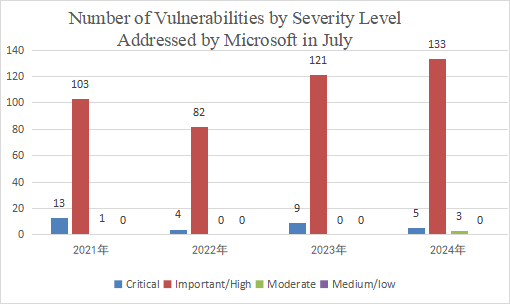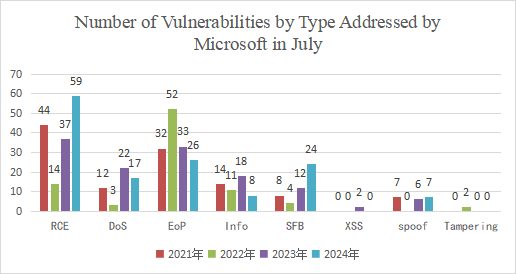Statistics
Vulnerability Trend

Figure 1 Vulnerabilities Patched by Microsoft in the Last 12 Months
- Microsoft released 141 patches in July 2024, including patches for five critical vulnerabilities.
- Based on Microsoft's historical vulnerability disclosures and the specific circumstances of this year, Sangfor FarSight Labs estimates that Microsoft will announce fewer vulnerabilities in the coming August in comparison to July. We expect a figure of approximately 80 vulnerabilities.
Comparison of Vulnerability Trends
The following figure shows the number of patches released by Microsoft in the month of July from 2021 to 2024.

Figure 2 Number of Windows Patches Released by Microsoft in July from 2021 to 2024
The following figure shows the trend and number of vulnerabilities at different severity levels addressed by Microsoft in July from 2021 to 2024.

Figure 3 Number of Vulnerabilities by Severity Level Addressed by Microsoft in July from 2021 to 2024
The following figure shows the number of vulnerabilities by type addressed by Microsoft in July from 2021 to 2024.

Figure 4 Number of Vulnerabilities by Type Addressed by Microsoft in July from 2021 to 2024
Data source: Microsoft security updates
- Compared to last year, the number of vulnerabilities addressed by Microsoft in July 2024 has increased.A total of 141 vulnerabilities, including five critical ones, have been reported this month.
- Compared to last year, the number of vulnerabilities at the High level addressed by Microsoft has increased, and that of vulnerabilities at the Critical level has decreased.133 vulnerabilities at the High level have been addressed, an increase of about 10%, and 5 vulnerabilities at the Critical level have been addressed, a decrease of about 44%.
- Compared to last year, the number of RCE vulnerabilities has increased, and that of DoS and EoPvulnerabilities has decreased. However, we should remain highly vigilant because, when combined with social engineering techniques, attackers can exploit RCE vulnerabilities to take over an entire LAN and launch attacks.
Details of Key Vulnerabilities
Analysis
Windows Hyper-V Privilege Escalation Vulnerability (CVE-2024-38080)
Microsoft Hyper-V, codenamed Viridian and formerly known as Windows Server Virtualization, is a local VM management program provided by Microsoft. It allows you to create VMs on x86-64 Windows hosts.
A privilege escalation vulnerability (CVE-2024-38080), with a CVSS score of 7.8 (high severity), has been found in Hyper-V. It allows attackers to obtain system permission on target systems. This vulnerability may cause In-The-Wild (ITW) attacks. Analysis results indicate that the vulnerability poses a high risk, and Sangfor FarSight Labs recommends that users install the latest Microsoft patches at the earliest opportunity.
Windows MSHTML Platform Spoofing Vulnerability (CVE-2024-38112)
A layout engine is a software component that takes marked-up content (such as HTML, XML, and image files) and formatting information (such as CSS and XSL) and displays the formatted content on the screen. MSHTML is a proprietary browser engine for the Microsoft Windows version of Internet Explorer, developed by Microsoft.
A spoofing vulnerability (CVE-2024-38112), with a CVSS score of 7.5 (high severity), has been found in MSHTML. It allows attackers to trick users into running malicious files, damaging the confidentiality, integrity, and availability of users' hosts. This vulnerability may cause ITW attacks. Analysis results indicate that the vulnerability poses a high risk, and Sangfor FarSight Labs recommends that users install the latest Microsoft patches at the earliest opportunity.
Affected Versions
| Vulnerability Name | Affected Versions |
|---|---|
| Windows Hyper-V Privilege Escalation Vulnerability (CVE-2024-38080) |
Windows Server 2022, 23H2 Edition (Server Core installation) Windows 11 Version 23H2 for x64-based Systems Windows 11 Version 23H2 for ARM64-based Systems Windows 11 Version 22H2 for x64-based Systems Windows 11 Version 22H2 for ARM64-based Systems Windows 11 Version 21H2 for ARM64-based Systems Windows 11 Version 21H2 for x64-based Systems Windows Server 2022 (Server Core installation) Windows Server 2022 |
| Windows MSHTML Platform Spoofing Vulnerability (CVE-2024-38112) |
Windows 10 Version 1809 for 32-bit Systems Windows Server 2019 Windows 11 Version 22H2 for x64-based Systems Windows 10 Version 21H2 for x64-based Systems Windows Server 2022 Windows 11 Version 21H2 for x64-based Systems Windows 11 Version 21H2 for ARM64-based Systems Windows Server 2019 (Server Core installation) Windows 10 Version 22H2 for ARM64-based Systems Windows 10 Version 1809 for x64-based Systems Windows Server 2008 for x64-based Systems Service Pack 2 (Server Core installation) Windows Server 2008 for x64-based Systems Service Pack 2 Windows Server 2008 for 32-bit Systems Service Pack 2 (Server Core installation) Windows Server 2008 for 32-bit Systems Service Pack 2 Windows 10 Version 1809 for ARM64-based Systems Windows Server 2016 (Server Core installation) Windows 10 Version 21H2 for 32-bit Systems Windows Server 2016 Windows 10 Version 1607 for x64-based Systems Windows 10 Version 1607 for 32-bit Systems Windows 10 for x64-based Systems Windows 11 Version 22H2 for ARM64-based Systems Windows 10 for 32-bit Systems Windows 11 Version 23H2 for x64-based Systems Windows 10 Version 22H2 for x64-based Systems Windows Server 2022, 23H2 Edition (Server Core installation) Windows Server 2022 (Server Core installation) Windows 10 Version 21H2 for ARM64-based Systems Windows Server 2012 R2 (Server Core installation) Windows 10 Version 22H2 for 32-bit Systems Windows 11 Version 23H2 for ARM64-based Systems Windows Server 2012 R2 |
Solutions
Official Solution
Microsoft has released patches for affected OS versions to fix the latest vulnerabilities. Please install the latest Windows security updates to install the patches or download the patch for individual vulnerabilities from Microsoft's security updates page:
- https://msrc.microsoft.com/update-guide/vulnerability/CVE-2024-38080
- https://msrc.microsoft.com/update-guide/vulnerability/CVE-2024-38112
Timeline
On July 10, 2024, Microsoft released a security update with patches for 141 vulnerabilities, including the Windows Hyper-V Privilege Escalation Vulnerability (CVE-2024-38080) and Windows MSHTML Platform Spoofing Vulnerability (CVE-2024-38112).
On July 10, 2024, Sangfor FarSight Labs released a vulnerability alert.
References
https://msrc.microsoft.com/update-guide/releaseNote/2024-Jul





